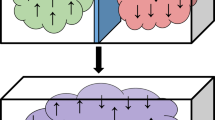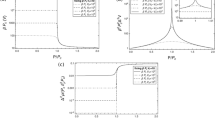Abstract
I AM glad to have elicited the very clear statement of his view which Mr. Jeans gives in NATURE of April 27. In general outline it corresponds pretty closely with that expressed by O. Reynolds in a British Association discussion at Aberdeen (NATURE, vol. xxxii. p. 534, 1885). The various modes of molecular motion are divided into two sharply separated groups. Within one group including the translatory modes, equipartition of energy is supposed to establish itself within a small fraction of a second; but between the modes of this group and those of vibration included in the other group, equipartition may require, Mr. Jeans thinks, millions of years. Even if minutes were substituted for years, we must admit, I think, that the law of equipartition is reconciled with all that is absolutely proved by our experiments upon specific heat, which are, indeed, somewhat rough in all cases, and especially imperfect in so far as they relate to what may happen over long intervals of time.
This is a preview of subscription content, access via your institution
Access options
Subscribe to this journal
Receive 51 print issues and online access
$199.00 per year
only $3.90 per issue
Buy this article
- Purchase on Springer Link
- Instant access to full article PDF
Prices may be subject to local taxes which are calculated during checkout
Similar content being viewed by others
References
"Remarks upon the Law of Complete Radiation," Phil. Mag., xlix. p. 539 June, 1900.
Rights and permissions
About this article
Cite this article
RAYLEIGH The Dynamical Theory of Gases and of Radiation. Nature 72, 54–55 (1905). https://doi.org/10.1038/072054c0
Issue Date:
DOI: https://doi.org/10.1038/072054c0
This article is cited by
-
Max Planck and the beginnings of the quantum theory
Archive for History of Exact Sciences (1961)
Comments
By submitting a comment you agree to abide by our Terms and Community Guidelines. If you find something abusive or that does not comply with our terms or guidelines please flag it as inappropriate.



